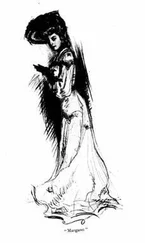James Cabell - Jurgen. A Comedy of Justice
Здесь есть возможность читать онлайн «James Cabell - Jurgen. A Comedy of Justice» весь текст электронной книги совершенно бесплатно (целиком полную версию без сокращений). В некоторых случаях можно слушать аудио, скачать через торрент в формате fb2 и присутствует краткое содержание. Жанр: Фэнтези, на английском языке. Описание произведения, (предисловие) а так же отзывы посетителей доступны на портале библиотеки ЛибКат.
- Название:Jurgen. A Comedy of Justice
- Автор:
- Жанр:
- Год:неизвестен
- ISBN:нет данных
- Рейтинг книги:5 / 5. Голосов: 1
-
Избранное:Добавить в избранное
- Отзывы:
-
Ваша оценка:
- 100
- 1
- 2
- 3
- 4
- 5
Jurgen. A Comedy of Justice: краткое содержание, описание и аннотация
Предлагаем к чтению аннотацию, описание, краткое содержание или предисловие (зависит от того, что написал сам автор книги «Jurgen. A Comedy of Justice»). Если вы не нашли необходимую информацию о книге — напишите в комментариях, мы постараемся отыскать её.
Jurgen. A Comedy of Justice — читать онлайн бесплатно полную книгу (весь текст) целиком
Ниже представлен текст книги, разбитый по страницам. Система сохранения места последней прочитанной страницы, позволяет с удобством читать онлайн бесплатно книгу «Jurgen. A Comedy of Justice», без необходимости каждый раз заново искать на чём Вы остановились. Поставьте закладку, и сможете в любой момент перейти на страницу, на которой закончили чтение.
Интервал:
Закладка:
Even Dolores, who was Queen of all the Philistines, could perceive that this man spoke truthfully. "I am sorry," says she, with real regret, "for you could be much run after in Philistia."
"Yes," said Jurgen, "as an instructor in mathematics."
"But, no, King Jurgen, not only in mathematics," said Dolores, reasonably. "There is poetry, for instance! For they tell me you are a poet, and a great many of my people take poetry quite seriously, I believe. Of course, I do not have much time for reading, myself. So you can be the Poet Laureate of Philistia, on any salary you like. And you can teach us all your ideas by writing beautiful poems about them. And you and I can be very happy together."
"Teach, teach! there speaks Philistia, and very temptingly, too, through an adorable mouth, that would bribe me with praise and fine food and soft days forever. It is a thing that happens rather often, though. And I can but repeat that art is not a branch of pedagogy!"
"Really I am heartily sorry. For apart from mathematics, I like you, King Jurgen, just as a person."
"I, too, am sorry, Dolores. For I confess to a weakness for the women of Philistia."
"Certainly you have given me no cause to suspect you of any weakness in that quarter," observed Dolores, "in the long while you have been alone with me, and have talked so wisely and have reasoned so deeply. I am afraid that after to-night I shall find all other men more or less superficial. Heigho! and I shall probably weep my eyes out to-morrow when you are relegated to limbo. For that is what the priests will do with you, King Jurgen, on one plea or another, if you do not conform to the laws of Philistia."
"And that one compromise I cannot make! Ah, but even now I have a plan wherewith to escape your priests: and failing that, I possess a cantrap to fall back upon in my hour of direst need. My private affairs are thus not yet in a hopeless or even in a dejected condition. This fact now urges me to observe that TEN, or the decade, is the measure of all, since it contains all the numeric relations and harmonies—"
So they continued their study of mathematics until it was time for Jurgen to appear again before his judges.
And in the morning Queen Dolores sent word to her priests that she was too sleepy to attend their council, but that the man was indisputably flesh and blood, amply deserved to be a king, and as a mathematician had not his peer.
Now these points being settled, the judges conferred, and Jurgen was decreed a backslider into the ways of undesirable error. His judges were the priests of Vel-Tyno and Sesphra and Ageus, who are the Gods of Philistia.
Then the priest of Ageus put on his spectacles and consulted the canonical law, and declared that this change in the indictment necessitated a severance of Jurgen from the others, in the infliction of punishment.
"For each, of course, must be relegated to the limbo of his fathers, as was foretold, in order that the prophecies may be fulfilled. Religion languishes when prophecies are not fulfilled. Now it appears that the forefathers of the flesh and blood prisoner were of a different faith from the progenitors of these obsolete illusions, and that his fathers foretold quite different things, and that their limbo was called Hell."
"It is little you know," says Jurgen, "of the religion of Eubonia."
"We have it written down in this great book," the priest of Vel-Tyno then told him,—"every word of it without blot or error."
"Then you will see that the King of Eubonia is the head of the church there, and changes all the prophecies at will. Learned Gowlais says so directly: and the judicious Stevegonius was forced to agree with him, however unwillingly, as you will instantly discover by consulting the third section of his widely famous nineteenth chapter."
"Both Gowlais and Stevegonius were probably notorious heretics," says the priest of Ageus. "I believe that was settled once for all at the Diet of Orthumar."
"Eh!" says Jurgen. He did not like this priest. "Now I will wager, sirs," Jurgen continued, a trifle patronizingly, "that you gentlemen have not read Gowlais, or even Stevegonius, in the light of Vossler's commentaries. And that is why you underrate them."
"I at least have read every word that was ever written by any of these three," replied the priest of Sesphra—"and with, as I need hardly say, the liveliest abhorrence. And this Gowlais in particular, as I hasten to agree with my learned confrère, is a most notorious heretic—"
"Oh, sir," said Jurgen, horrified, "whatever are you telling me about Gowlais!"
"I tell you that I have been roused to indignation by his Historia de Bello Veneris —"
"You surprise me: still—"
"—Shocked by his Pornoboscodidascolo —"
"I can hardly believe it: even so, you must grant—"
"—And horrified by his Liber de immortalitate Mentulæ —"
"Well, conceding you that earlier work, sir, yet, at the same time—"
"—And have been disgusted by his De modo coeundi —"
"Ah, but, none the less—"
"—And have shuddered over the unspeakable enormities of his Erotopægnion! of his Cinædica! and especially of his Epipedesis , that most pestilential and abominable book, quem sine horrore nemo potest legere —"
"Still, you cannot deny—"
"—And have read also all the confutations of this detestable Gowlais: as those of Zanchius, Faventinus, Lelius Vincentius, Lagalla, Thomas Giaminus, and eight other admirable commentators—"
"You are very exact, sir: but—"
"—And that, in short, I have read every book you can imagine," says the priest of Sesphra.
The shoulders of Jurgen rose to his ears, and Jurgen silently flung out his hands, palms upward.
"For, I perceive," says Jurgen, to himself, "that this Realist is too circumstantial for me. None the less, he invents his facts: it is by citing books which never existed that he publicly confutes the Gowlais whom I invented privately: and that is not fair. Now there remains only one chance for Jurgen; but luckily that chance is sure."
"Why are you fumbling in your pocket?" asks the old priest of Ageus, fidgeting and peering.
"Aha, you may well ask!" cried Jurgen. He unfolded the cantrap which had been given him by the Master Philologist, and which Jurgen had treasured against the time when more was needed than a glib tongue. "O most unrighteous judges," says Jurgen, sternly, "now hear and tremble! 'At the death of Adrian the Fifth, Pedro Juliani, who should be named John the Twentieth, was through an error in the reckoning elevated to the papal chair as John the Twenty-first!'"
"Hah, and what have we to do with that?" inquired the priest of Vel-Tyno, with raised eyebrows. "Why are you telling us of these irrelevant matters?"
"Because I thought it would interest you," said Jurgen. "It was a fact that appeared to me rather amusing. So I thought I would mention it."
"Then you have very queer ideas of amusement," they told him. And Jurgen perceived that either he had not employed his cantrap correctly or else that its magic was unappreciated by the leaders of Philistia.
33. Farewell to Chloris
Now the Philistines led out their prisoners, and made ready to inflict the doom which was decreed. And they permitted the young King of Eubonia to speak with Chloris.
"Farewell to you now, Jurgen!" says Chloris, weeping softly. "It is little I care what foolish words these priests of Philistia may utter against me. But the big-armed axemen are felling my tree yonder, to get them timber to make a bedstead for the Queen of Philistia: for that is what this Queen Dolores ordered them to do the first thing this morning."
And Jurgen raised his hands. "You women!" he said. "What man would ever have thought of that?"
Читать дальшеИнтервал:
Закладка:
Похожие книги на «Jurgen. A Comedy of Justice»
Представляем Вашему вниманию похожие книги на «Jurgen. A Comedy of Justice» списком для выбора. Мы отобрали схожую по названию и смыслу литературу в надежде предоставить читателям больше вариантов отыскать новые, интересные, ещё непрочитанные произведения.
Обсуждение, отзывы о книге «Jurgen. A Comedy of Justice» и просто собственные мнения читателей. Оставьте ваши комментарии, напишите, что Вы думаете о произведении, его смысле или главных героях. Укажите что конкретно понравилось, а что нет, и почему Вы так считаете.



